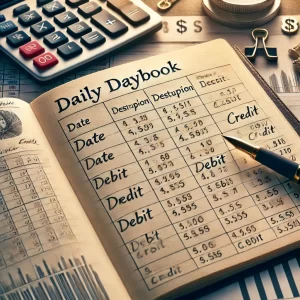
What is a “Daybook” in Accounting?
Introduction
In the world of accounting, accuracy and proper record-keeping are crucial for maintaining the financial health of any business. One of the foundational tools used in accounting to track daily financial transactions is the daybook. Whether you are managing a small business or handling complex financial data in a large organization, understanding the role of a daybook can significantly improve financial accuracy and reporting efficiency. This article explores the concept of a daybook in accounting, its purpose, benefits, limitations, and how it compares to other financial records.
Definition of a Daybook
A daybook is a primary accounting record used to record financial transactions in chronological order as they occur. It serves as the first point of entry for all business transactions before they are transferred to the general ledger. Daybooks help businesses maintain an accurate and real-time record of their daily financial activities, including cash sales, credit sales, purchases, and other financial dealings.
A daybook is also known as a book of original entry because it captures raw financial data directly from the source of the transaction. The information recorded in the daybook typically includes:
- Date of the transaction
- Description of the transaction
- Amount involved
- Type of transaction (e.g., sales, purchases, expenses)
- Reference number or invoice number
Applications of a Daybook
Daybooks are used in various accounting functions, including:
- Recording Sales Transactions – All cash and credit sales are recorded in the sales daybook.
- Tracking Purchases – Businesses maintain a purchase daybook to monitor and organize their purchasing activities.
- Managing Expenses – Payments and expenses are recorded to track outgoing cash flow.
- Bank Reconciliation – Helps in matching transactions with bank statements to ensure accuracy.
- Preparing Financial Reports – Data from daybooks is summarized and transferred to the general ledger, which forms the basis for preparing financial reports.
Benefits of Using a Daybook
Using a daybook in accounting offers several advantages:
Enhanced Accuracy – Recording transactions immediately reduces the chances of missing or misreporting transactions.
Improved Organization – Daybooks classify transactions into categories (sales, purchases, expenses), making it easier to analyze and retrieve data.
Real-Time Tracking – Helps businesses maintain a current record of their financial position.
Compliance and Audit Readiness – Accurate daybooks simplify the process of audits and financial compliance.
Data Consistency – Provides a consistent format for recording financial data, reducing discrepancies.
Limitations of a Daybook
Despite its advantages, a daybook has certain limitations:
Manual Errors – If maintained manually, daybooks are prone to human error in data entry.
Time-Consuming – Recording every transaction can be time-intensive, especially for businesses with high volumes of transactions.
Limited Insight – A daybook records transactions but does not provide deeper financial analysis.
Duplication Risk – Without proper controls, there is a risk of recording the same transaction multiple times.
Data Overload – For large businesses, handling a high volume of daybook entries can be overwhelming.
Types of Daybooks in Accounting
Daybooks are categorized based on the nature of the transactions recorded:
- Sales Daybook – Records all credit sales transactions.
- Purchase Daybook – Captures all credit purchases.
- Cash Daybook – Records cash receipts and payments.
- Returns Daybook – Tracks goods returned by customers or returned to suppliers.
- General Daybook – Records miscellaneous transactions that do not fall into the other daybook categories.
Comparative Table: Daybook vs. Other Accounting Records
| Criteria | Daybook | Journal | Ledger | Trial Balance |
|---|---|---|---|---|
| Purpose | Record daily transactions | Record double-entry transactions | Summarize daybook and journal entries | Verify debit and credit balance accuracy |
| Chronological Order | Yes | Yes | No | No |
| Level of Detail | High | Medium | Summary | Summary |
| Frequency of Use | Daily | Periodic | Periodic | Monthly/Quarterly |
| Correction Allowed | No | Yes | Yes | No |
Why is a Daybook Important in Accounting?
A daybook plays a crucial role in maintaining the accuracy and integrity of a business’s financial records. By systematically recording transactions, businesses can:
- Monitor cash flow effectively
- Prepare accurate financial statements
- Ensure compliance with tax regulations
- Detect fraud or discrepancies early
The data from the daybook flows into other accounting records, forming the foundation for preparing the general ledger, trial balance, and financial statements. Without a well-maintained daybook, businesses risk facing inaccurate financial reporting, which could lead to compliance issues and financial instability.
Conclusion
A daybook is a vital component of the accounting process, serving as the first point of entry for financial transactions. It ensures that all business activities are documented accurately and consistently, helping businesses stay organized and financially stable. While daybooks offer enhanced accuracy and real-time tracking, they also have limitations such as potential manual errors and data overload. However, with proper management and integration with modern accounting software, businesses can maximize the benefits of a daybook and maintain a clear financial overview.
В
For further details visit:В https://vibrantfinserv.com/service-detail-25.php
В
FAQs:

For further details access our website: https://vibrantfinserv.com
Web Link:В В В https://vibrantfinserv.com
FB Link:В В В В В В https://fb.me/vibrantfinserv
Insta Link:В В https://www.instagram.com/vibrantfinserv2/
Twitter:В В В В В В https://twitter.com/VibrantFinserv
LinkedIn:В В В https://www.linkedin.com/in/vibrant-finserv-62566a259
